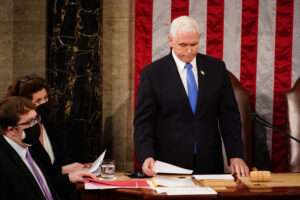The Volokh Conspiracy
Mostly law professors | Sometimes contrarian | Often libertarian | Always independent
A Guide to Fixing the Electoral Count Act
Andy Craig of the Cato Institute has an excellent overview of this important issue.

Andy Craig of the Cato Institute recently published "How to Pick a President: A Guide to Electoral Count Act Reform" an excellent overview of the problems with the Electoral Count Act revealed in the awful aftermath of the 2020 election, and how to fix them. Craig is a leading expert on ECA reform, and is his paper is a great introduction for anyone interested in these issues.
Here is the summary:
The peaceful transfer of power, regular elections, and limited terms of office are among our most precious legacies of the American Revolution. These bedrock constitutional principles are indispensable both to "insure domestic Tranquility" and to "secure the Blessings of Liberty to ourselves and our Posterity."
But as we saw in the 2020 election, operating under an antiquated rule book can pose serious risks. The Electoral Count Act of 1887 (ECA), with minor amendments since, is the statutory codification of important details left unaddressed by the Constitution's sparse provisions for electing a president. It is in dire need of reform.
America should not have to confront a potential constitutional crisis every four years. We should have confidence that the rule of law will prevail in determining the occupant of our highest office. The ECA as it stands is woefully inadequate to provide that assurance.
There is broad agreement on the need for ECA reform. Proposals range from a broad, expansive bill that could be criticized as overly complicated and assuming a role for Congress beyond the Constitution's limits, to a narrow, minimalist bill that could leave important problems unresolved by only making minor cosmetic changes.
There is a better middle course, built on a thorough consideration of the constitutional principles at stake. The ECA as it exists now is too flawed to save. Even if no substantive changes were to be made, a thorough rewrite is necessary to clarify the muddled and confusing language that Congress adopted in 1887. At the same time, ECA reform should respect the limits of Congress's role, in line with the principle that the ECA is simply codifying and clarifying constitutionally mandated processes. To that end, this analysis provides a top‐to‐bottom how‐to guide for an ECA reform that is both constitutionally and practically sound.
As Craig's paper lays out, ECA reform needs to address three interrelated problems:
1. Preventing state governments from, in effect, changing the rules after election day, in order to reverse election results they don't like.
2. Preventing Congress from throwing out electoral votes for bogus reasons (as some GOP members of Congress sought to do after the 2020 election).
3. Making it more clear that the Vice-President does not have the power to invalidate electoral votes (a step then-VP Mike Pence rightly refused to take in January 2021, despite the urging of Donald Trump).
While there is some dispute over details, there is broad agreement on these and related points among election and constitutional law experts across the political spectrum. The recent National Constitution Center project on "Restoring the Guardrails of Democracy" revealed that this is a point of agreement between the conservative, libertarian, and progressive teams that participated. The issue is covered in some detail in both the Team Libertarian report (which I coauthored with Clark Neily and Walter Olson), and the Progressive Report (written by election scholars Edward Foley and Franita Tolson). Team Conservative leader Sarah Isgur noted their agreement in a later NCC webinar.
It also appears that ECA reform has substantial bipartisan support in Congress. But whether it can pass before the fall 2022 elections remains to be seen. For obvious reasons, reform will become harder and harder to achieve as we get closer to 2024.
ECA reform won't cure all the ailments of American democracy. But it can eliminate some dangerous vulnerabilities for which - unlike many of our other problems - there are simple legislative fixes.


Show Comments (402)